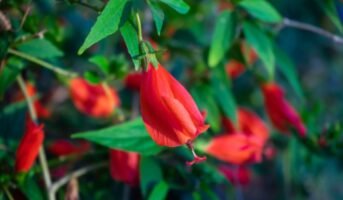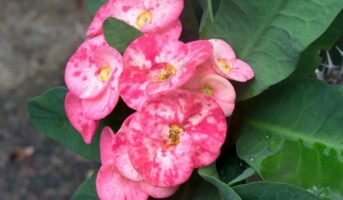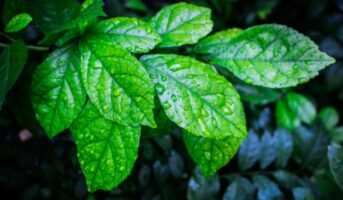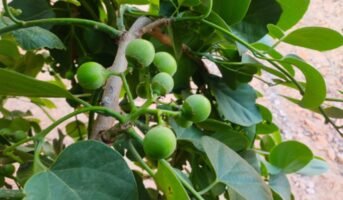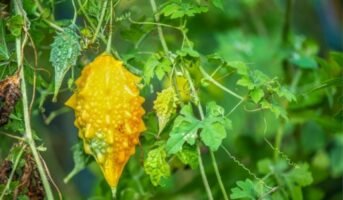Ajwain is a spice that is used to add flavour to food. It has been used for centuries and has numerous uses. It can be used in a variety of ways, including in sauces, as an addition to curries, or even as a condiment.
The plant’s name comes from one of its two common names: Ajwain (also spelt Ajan) and Zafrani. The plant’s scientific name is Trachyspermum ammi. The seeds are brownish-green in colour and have a bitter taste with a pungent smell.
Ajwain is a spice that is used in many cuisines. It can be found in Indian, Mexican, and Middle Eastern recipes. It has a sweet and nutty flavour that makes it perfect for adding to meats, poultry, and vegetables. Ajwain is often used with lentils, legumes such as dal or chickpeas and vegetables such as peas or potatoes. It can also be added to soups or stews at times when you are trying to add more flavour without adding too much salt or fat to your meal.
See also: All about India’s National Tree- Banyan
Ajwain: Quick facts
| Common Name | caraway |
|---|---|
| Botanical Name | Trachyspermum ammi |
| Kingdom | Plantae |
| Clade | Tracheophytes |
| Family | Apiaceae |
| Height | 12 inches |
| Native | Indian, Mexican, and Middle Eastern |
| Benefits | Health benefits |
Source: Shutterstock
know about: banyan tree
Ajwain: How to grow
By Cuttings
- Stem cutting is the most effective method to cultivate ajwain.
- Snip off a 5-6 inch long tip or branch from a mature plant.
- Several nodes should be present in the cut plant. Put it several inches deep in garden soil or a container after dipping it in a rooting hormone.
- Water it thoroughly and place it in a shaded location.
By Seeds
- The spring plantings will produce summer flowering harvests, while the fall plantings will produce spring harvests.
- Several inches deep, sow the seeds.
- Plants can be grown in a garden with well-amended soil or in containers with potting mixed and misted regularly.
- Provide partial shade for the container. It takes 7-10 days for the seeds to germinate.
Ajwain: Maintenance
- As the leaves of the ajwain plant are jade green by nature, but when exposed to inadequate sunlight, they turn dark green. West-facing or south-facing windows will benefit this houseplant.
- Water it in the early morning or evening when the soil is slightly moist but not soggy.
- When growing in the garden, add compost or organic matter to the soil if it is loose, well-drained, and well-aerated. A potting mix is suitable for pots.
- To let excess water drain, choose a pot with at least one drainage hole at the bottom that is at least 12-inches deep and wide.
Health benefits Of ajwain
Ajwain is a plant that has been used in India since the Vedic Age. It is used as an anti-inflammatory, antipyretic and analgesic. The leaves of Ajwain are dried and used to prepare various ointments and pastes. Ajwain works by reducing swelling and pain caused by inflammation in the body.
Ajwain is an expectorant
Ajwain oil act as an expectorant and helps in treating cold, cough and other infections related to respiration including bronchitis. It is effective in relieving bronchitis and asthma symptoms while reducing coughs and wheezing caused by these conditions.
Ajwain is effective in treating many chronic diseases, including arthritis, gout, fever, indigestion, headache, sinusitis, stomach ache, toothache and back pain. Ajwain can also help reduce the risk of developing cancer if taken regularly.
Ajwain is a diuretic
It helps in removing extra salt from your body and thus help in maintaining blood pressure.
Ajwain is an abortifacient
Ajwain can cause uterine contractions and hence lead to an abortion.
Ajwain is an ammenagogue
It also helps to relieve menstrual cramps and bladder spasms.
Ajwain is a laxative
The most common use of Ajwain is to treat indigestion and upset stomach. It helps in reducing the inflammation caused by the digestive system, which can make you feel better if you are suffering from indigestion or acidity. Ajwain has been found to increase appetite, which makes it an important addition to any diet plan.
Ajwain also helps in reducing fever, nausea, and vomiting by improving digestion and absorption of food. This helps in reducing the symptoms of these conditions.
It has been said that Ajwain can also help in treating tuberculosis and lung infections. This is because it contains thymol, which helps in killing germs inside your body. So they cannot cause any harm to you. The main ingredient that makes Ajwain effective against TB is thyme oil, also known as thymol.
Ajwain also has antimicrobial properties that help prevent food poisoning. This spice reduces the growth of bacteria in foods such as meat, fish or vegetables by killing off harmful microbes before they can proliferate into harmful colonies.
Diarrhoea or dysentery might be treated by consuming ajwain seeds. In a glass of water, boil a handful of ajwain seeds. To treat diarrhoea, you can cool this mixture and consume it.
How is ajwain helpful for arthritis pain relief?
Ajwain seeds are anti-inflammatory and anti-microbial in nature and these help in reducing pain cause by arthritis. Application of ajwain seed paste on the affected areas or soaking your joints in ajwain filled hot water tub helps greatly.
Ajwain good for healthy skin
Ajwain is very good for your skin and hair. Ajwain has thyme in it which helps in preventing bacterial growth in the skin. Regular oral consumption of Ajwain will help in getting a clear skin. Additionally, one can also use an ajwain face pack for a clear skin.
Ajwain good for weight loss
A good metabolism aids in weight loss as the food consumed is digested properly. Ajwain improves metabolism because of presence of thymol. Also, with the help of ajwain your body can absorb all nutrients and fat accumulation is reduced considerably thus helping in weight loss.
Ajwain: Side effects
Ajwain seeds are not harmful when consumed in moderation. The excessive consumption of ajwain, however, may result in some side effects in people suffering from conditions such as diverticulitis (a disease of the digestive tract lining), ulcerative colitis (inflammatory bowel disease), or liver diseases.
As a result of the stimulation of gastric secretions, ajwain seeds can worsen peptic ulcers that already exist. If this effect is observed, a physician must be consulted.
Some people may also experience nausea, skin irritation, vomiting, allergy, and headache as a result of overconsumption of ajwain.
Ajwain: Precautions which need to be taken:
Using ajwain seeds requires consideration of the following points:
- Peptic ulcer sufferers and those with liver disease should refrain from consuming ajwain.
- It is not possible to store ajwain seeds indefinitely.
- The seeds of ajwain need to be stored in an air-tight bottle in a cool and dry environment.
- Direct sunlight and moisture must be kept away from them.
FAQs
How can ajwain be used?
Ajwain has active enzymes that increase stomach acid flow, relieving indigestion, bloating, and gas.
How does ajwain taste?
The celery family contains ajwain, a seed-like fruit with a deep flavour and a pungent fragrance. There are notes of oregano, celery seed, and anise in addition to the aroma that resembles that of thyme.
| Got any questions or point of view on our article? We would love to hear from you.Write to our Editor-in-Chief Jhumur Ghosh at [email protected] |
Housing News Desk is the news desk of leading online real estate portal, Housing.com. Housing News Desk focuses on a variety of topics such as real estate laws, taxes, current news, property trends, home loans, rentals, décor, green homes, home improvement, etc. The main objective of the news desk, is to cover the real estate sector from the perspective of providing information that is useful to the end-user.
Facebook: https://www.facebook.com/housing.com/
Twitter: https://twitter.com/Housing
Email: [email protected]

